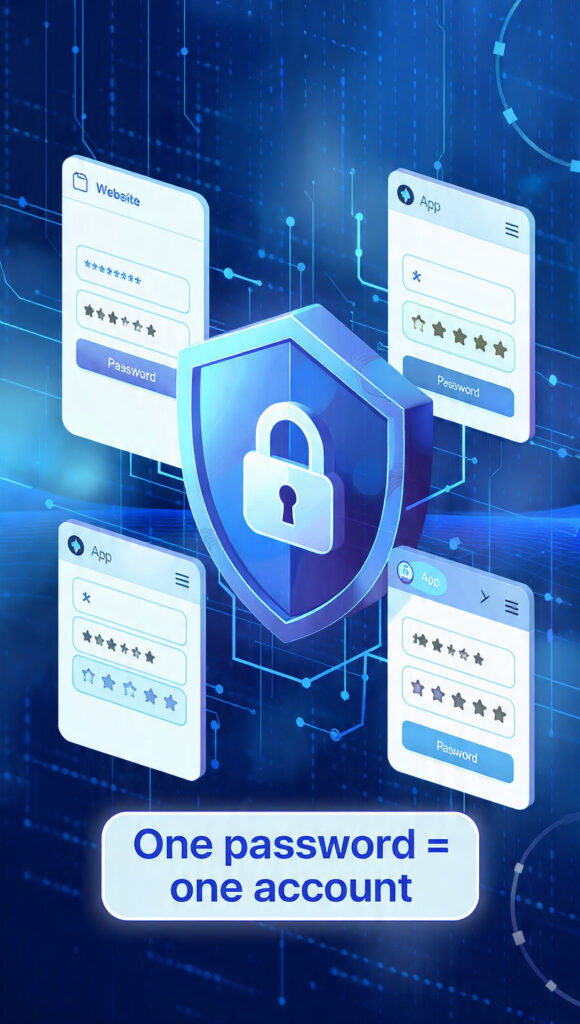
1. What is a one-time password?
A one-time password is, as its name indicates, a password that expires after having been used only once. The abbreviation OTP is also frequently encountered, as well as the terms “OTP key” and “OTP code.”
The one-time password generally corresponds to an alphanumeric OTP key (letters and numbers) and is generated for a single login procedure. After the user has logged in using a one-time password, it is no longer valid and can no longer be used for subsequent logins.
OTP passwords are commonly used in two-factor authentication procedures, for example in online banking, but also increasingly in the business world.
2. Building an effective line of defense to protect our privacy is essential.
Using a unique password for each service prevents cybercriminals from breaking into everything at once. It is one of the most important rules in cybersecurity.
A unique password for each service?
The uniqueness of your passwords is extremely important for your security. It happens that common websites are hacked and login credentials are stolen and then resold most of the time. Indeed, hackers try to use these same login credentials on other sites to access your other accounts and get hold of all your data.
Consequence: Emptied bank accounts, stolen identities, fraudulent use of data are all incidents that should push us to strengthen our security and define an effective line of defense to protect our privacy.
Using a unique password for each service prevents cybercriminals from getting in everywhere at the same time. It is one of the most important rules of cybersecurity.
3. Why are unique passwords indispensable?
– Protection against data breaches: Cyberattacks and data breaches are constantly increasing. If you use the same password everywhere, all your accounts may be compromised if one of them is hacked. By using unique passwords, you reduce this risk to a minimum.
– A strong barrier against cybercriminals: Hackers are constantly looking for ways to break into online accounts. By using unique and complex passwords, you make their task more difficult, thus strengthening the security of your accounts.
– Protection of your sensitive information: Your online accounts and personal spaces often contain sensitive information, ranging from personal data to financial details. By using unique passwords, you prevent this vital information from falling into the wrong hands.
4. Some ideas to manage your unique passwords
– Use a password manager: These tools generate and securely store unique passwords for every site you use. You only need one master password to access all your accounts.
– Create a secret phrase: Build a long and memorable secret phrase by combining words, numbers, and special characters. For example: “Travel$SafelyEverywhere!”.
– Change your passwords regularly: Periodically updating your passwords further reinforces your security.
Online security is everyone’s business, and every action counts. By choosing to create and use unique passwords for every site, you protect your personal and financial information while contributing to making each website safer for everyone.
Don’t wait to strengthen the security of your online accounts! Start today by using strong, unique passwords. Your online safety depends on it.
Cybercriminals use various techniques to access sensitive information, such as:
– Brute-force attacks: meaning trying as many combinations as possible: “aa”, then “ab”, then “ac”, … as well as the passwords most commonly used by users: “azerty123”, “1234”, …
– Phishing
– Malware
– Searching your social networks for names you might have used as passwords (your pet’s name, your children’s birth dates, etc.)
5. Uniqueness
Each account must have a unique password. Using the same password for several accounts increases the risk that a cybercriminal will access several of your accounts if just one password is compromised (for example, if one of the sites you use is hacked).
Traditional passwords have many weaknesses. This even applies to strong passwords (or those considered strong) that are carefully chosen. The main problem is the following: when a password is used regularly, there is a risk that unauthorized (and malicious) people may get hold of it.
This often happens during replay attacks: the password is intercepted and then used by criminals to log in.
And you don’t need to be careless to become a victim. In recent years, several well-known online services have been targeted by hackers, and the data of thousands of customers have been stolen.
6. How can we protect ourselves?
One possibility is to change the password regularly, at short intervals (without doing it every day either). Another solution, much easier to implement, is to use a one-time password, or OTP.
7. When is it wise to use a one-time password?
It is recommended to use one-time passwords for all online services and websites that handle particularly sensitive data. For example:
– online banking
– financial services, such as online stock accounts or cryptocurrency exchange platforms
– sensitive company data
– confidential communication tools
Not all websites require a one-time password. But in general, you should think about using strong passwords, especially when you change them rarely. Studies show that despite constantly increasing cybercrime, users are still too often neglecting their security.
8. How do cybercriminals steal passwords?
Hackers have many techniques:
– Brute force: automatic attempts of thousands of combinations
– Phishing: fake emails or fake websites designed to trick you
– Malware: spyware that records your keystrokes
– Gathering personal information: searching your social networks to guess your passwords
These attacks work particularly well when passwords are simple or reused.
(uneo.com)
(informatique pour tous.com)
(spamenmoins.com)
(ionos.com)
(8p-design.com)